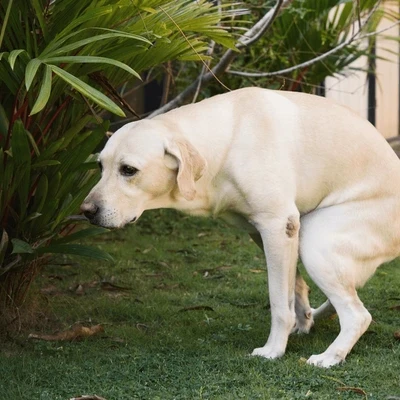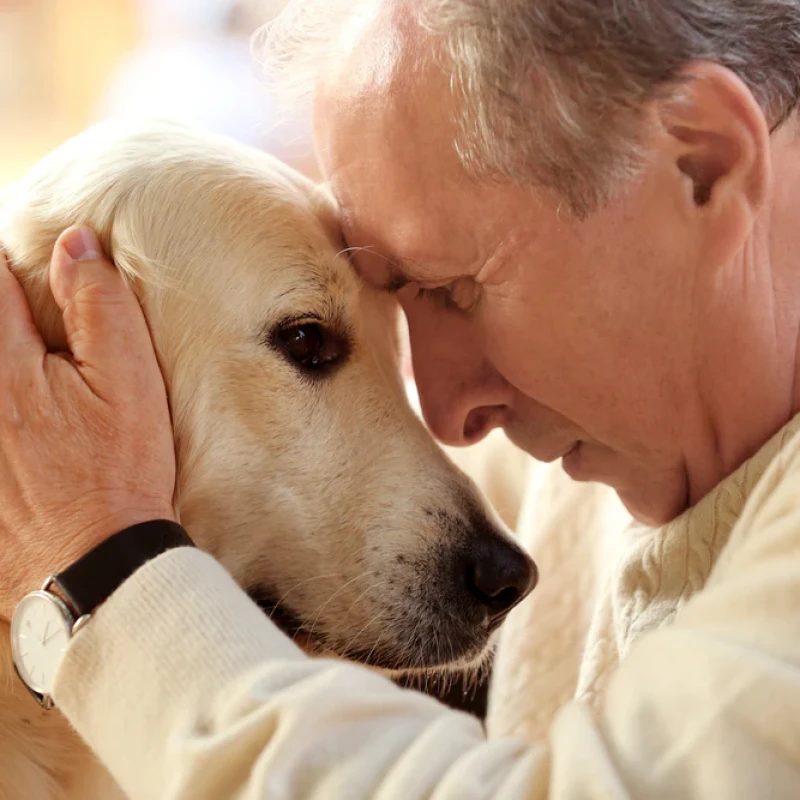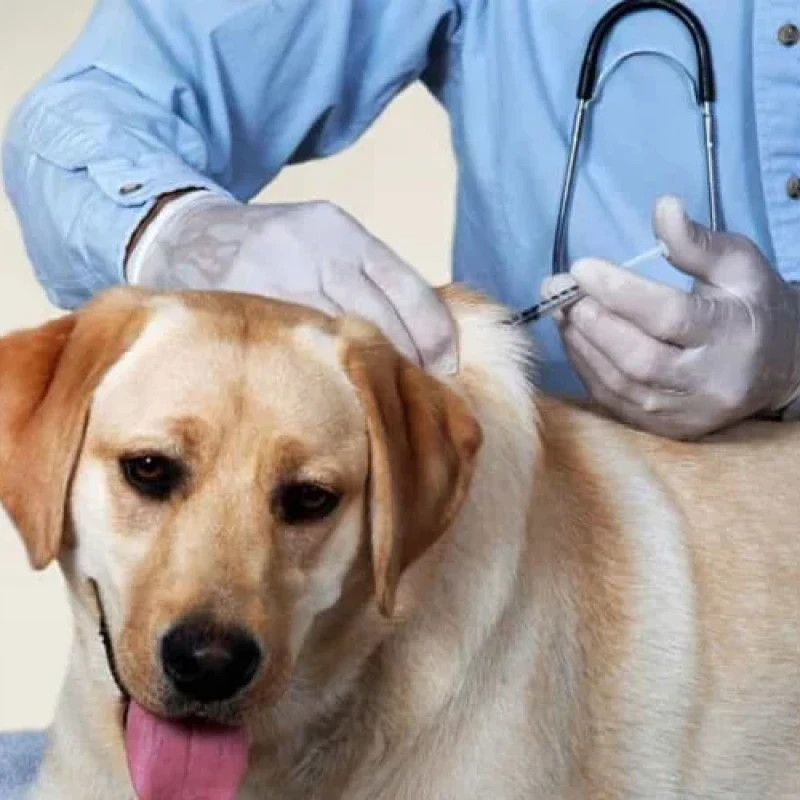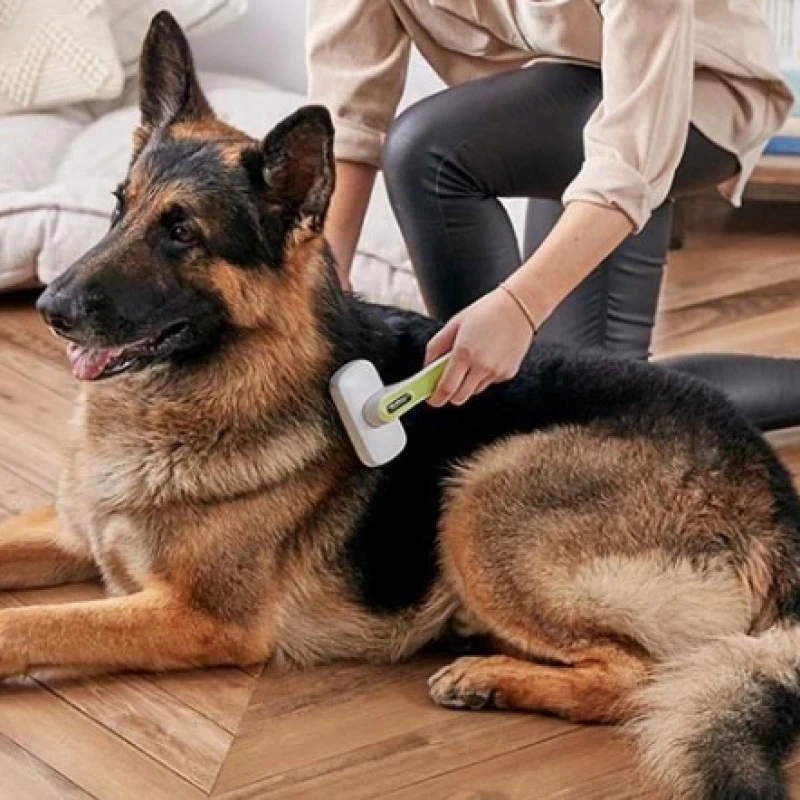Constipation in dogs not only reduces their agility and liveliness but also poses many health risks if not detected and addressed in a timely manner. But how can you recognize if your dog is facing this issue, and what should you do to treat it? Don't worry, Pet Mart has compiled the signs to look out for along with effective treatment methods. Let’s explore them in the following article.
Causes of Constipation in Dogs
How does constipation occur in dogs? Constipation in dogs can arise from many factors, ranging from external environmental influences to internal health issues. To take care of your pet in the best way possible, it's essential to understand these causes:
External Environmental Factors
1.Being confined or leashed for too long: Dogs that lack exercise or are not walked frequently may experience constipation. When they cannot relieve themselves in time, they often hold it in, leading to a buildup of feces in their bodies.
2.Low-fiber diet A diet lacking in fiber can reduce moisture in the colon, making feces hard and difficult to pass.
3.Dehydration A lack of water in the body can cause constipation, as water helps soften stool.
4.Ingesting foreign objects Bones, plants, dirt, or stones can increase the size and dryness of feces.
5.Psychological issues Stress or changes in living conditions can sometimes lead to constipation in dogs.
Internal Body Factors
- **Sudden pain:** Dogs may experience pain around the anus or near the rectum due to injuries or abscesses. Additionally, arthritis can make sitting positions uncomfortable, leading to reluctance in bowel movements and causing constipation.
- **Intestinal obstruction:** The process of eliminating feces can be impeded by tumors, causing pain and discomfort. Fur may become tangled and form large hairballs, leading to obstruction, which commonly occurs in long-haired breeds. Internal organ deformities can also be a factor.
- **Tumors in the colon:** These can obstruct the process of defecation.
- **Pelvic hernia:** An enlarged prostate can also lead to constipation. A fractured pelvis can restrict the pelvic cavity upon healing, adversely affecting the colon and restricting the flow of feces.
- **Neuromuscular disorders:** These can also cause constipation by weakening the colon's function. Spinal deformities or abnormal discs near the pelvis can interrupt the fecal elimination process.
- **Digestive disorders:** Conditions like hypothyroidism or kidney failure can disrupt digestive secretions and electrolyte balance. This imbalance can lead to dehydration and decreased intestinal contractions, resulting in prolonged retention of feces in the intestines.
- **Medications:** Painkillers, antibiotics, sedatives, and some other medications may have constipation as a side effect.
Signs of Constipation in Puppies
Recognizing constipation in dogs can sometimes be more complex than we think. Here are some common signs and symptoms:
- **Difficulty Defecating:** Dogs may try to relieve themselves multiple times but fail or produce only small amounts of hard stool. There may be feces stuck around the anus, causing discomfort, especially in long-haired breeds like Collies or Poodles. In some cases, the feces may appear slimy.
- **Health Indicators:** Symptoms may include loss of appetite, vomiting, a hard and bloated abdomen, swollen or protruding anus, or bleeding. Pain while straining indicates a need for immediate veterinary attention.
- **Fecal Characteristics:** Feces are one of the key indicators of a dog’s health. Healthy dogs typically produce well-formed, brown to dark yellow feces. Depending on their age and diet, feces can vary in firmness. Abnormal fecal characteristics may signal constipation. You can refer to the article on evaluating a dog's health through its feces [here](#).
Consequences of Constipation
Dogs with constipation not only experience discomfort during bowel movements but may also signal serious health issues. To keep your dog healthy, it's crucial to pay attention to their diet and daily activity levels.
Treatments and Medications for Constipated Dogs
What should you do if your dog is constipated? If your dog is experiencing constipation, the first step is to consult with a veterinarian before beginning any treatment or using any medications. However, here are some common medications and treatment methods for constipated dogs:
Natural Methods
- **Feeding raw eggs:** A raw egg can help relieve constipation. However, avoid giving your dog any other food after feeding them an egg.
- **Ensuring plenty of water:** It’s important to provide your dog with sufficient water daily.
- **Checking and adjusting electrolyte balance:** Maintaining proper electrolyte balance is crucial to prevent dehydration.
Use of Medications and Medical Measures
Note: Do not administer medications to dogs with constipation without veterinary guidance.
Laxatives and enemas: In cases of severe constipation, using laxatives or enemas can help relieve hard stools. There are some mild laxatives safe for dogs, such as lactulose or docusate sodium.
Mineral oil: Mineral oil acts as a lubricant, making it easier for stool to pass. However, it should not be used long-term without veterinary guidance.
Psyllium husk: This is a natural source of fiber that can help promote bowel movement and make it easier for dogs to defecate. You can mix it into your dog's food.
Pain relief medications: If constipation causes inflammation or pain around the anus, a veterinarian may prescribe pain relief medications.
Antispasmodic medications: In some cases, constipation can be due to intestinal spasms, and antispasmodic drugs may be prescribed.
Fiber supplements: Supplements like wheat bran or pumpkin can help increase fiber intake and improve constipation.
Digestive enzymes: When selecting digestive enzymes for dogs, research the ingredients, the amount of beneficial bacteria per dose, and consider the product's source.
Care for Dogs with Constipation
Dogs with constipation can benefit from adjusting their diet to increase fiber and moisture. Providing a mixture of ground meat and vegetables can be an effective solution:
Ground meat porridge: Porridge is high in moisture, easy to digest, and can help soften stool. Ground meat provides essential protein.
Oatmeal porridge: Oatmeal is a good source of fiber. You can cook oatmeal porridge and feed it to your dog daily.
Brown rice porridge: Brown rice is richer in fiber than white rice and can help stimulate the intestines.
Amaranth greens: Amaranth greens are a good source of fiber and contain a lot of water. Fiber helps stimulate bowel activity and softens stool.
Sweet potato greens: Depending on the type of sweet potato greens, most provide a good amount of fiber.
Leafy greens: Greens like broccoli and cooked, pureed vegetables can be added to your dog’s diet.
Mashed pumpkin: Pumpkin helps regulate the intestines and provides fiber. Cook and mash the pumpkin before feeding it to your dog.
Cooked lean meat: Cooked, ground chicken or lean beef can be mixed with porridge or pumpkin to enhance appeal.
Fish oil: Fish oil provides Omega-3, which helps soften stool and ease bowel movements.
Olive oil or flaxseed oil: A small amount of these oils can help lubricate the intestines.
Fruits: Some fruits, like apples (seeds removed) or pineapple, can be pureed and mixed into food.
When adding any dietary changes for your dog, do so gradually and monitor them for any signs of diarrhea or poor digestion. Some dogs may react adversely to sudden dietary changes.
Early Prevention of Constipation at Home
Constipation in dogs often arises from unsuitable food and care routines. Here are some effective ways to prevent this condition at home:
Provide Water and Food
Increase and supplement fiber: Providing a moderate amount of fiber for your dog is crucial. This not only helps prevent constipation but also supports digestion.
Mix dry food and pâté: This helps increase the moisture content of the food, making it more appealing for the dog and supporting digestion.
Be mindful of dry kibble: If using dry food, ensure your dog has plenty of water available to drink.
Ensure adequate water supply: Having a clean water source readily available prevents dehydration and supports digestion.
Increase Activity
Walk and exercise your dog regularly: This not only keeps your dog happy but also stimulates the digestive system to function effectively.
Regular health monitoring: When noticing any unusual signs, observe and monitor your dog promptly. This helps detect health issues early and facilitates effective treatment.
When facing constipation in dogs, timely consultation with veterinarians is crucial for ensuring your pet’s health and quality of life. Additionally, monitoring and early detection of abnormal constipation signs can help prevent complications and potential progression into more serious health issues.













